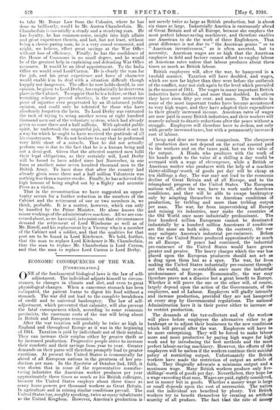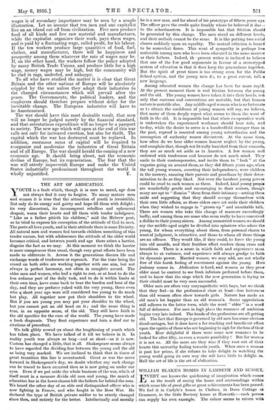ECONOMIC CONSEQUENCES OF THE WAR.
[CONIMUNICA TED.]
ONE of the fundamental biological laws is the law of self- adjustment. The individual adjusts himself to circum- stances, to changes in climate and diet, and even to great physiological changes. When a cancerous stomach has been extirpated, the patient learns to digest his food without a stomach. The war did not lead to the complete breakdown of credit and to universal bankruptcy. The law of self- adjustment; which prevented that calamity, will also prevent the fatal consequences which, according to some economic pessimists, the enormous costs of the war will bring about in British and European economics.
After the war taxation will probably be twice as high in England and throughout Europe as it was in the beginning of 1914. Taxation is paid by individuals out of their surplus. They can increase their surplus either by greater thrift or by increased production. Progressive people strive to increase their comforts and their savings from year to year. Greater demands on their purse will therefore promptly lead to greater exertions. At present the United States is economically far ahead of all European nations in the greatness of her pro- duction per man. In the Spectator of October 2nd, 1915, it was shown that in some of the representative manufac- turing industries the American worker produces per year approximately three times as much as his British colleague, because the United States employs about three times as many horse-powers per thousand workers as Great Britain. In ae-riculture and in mining similar conditions prevail. The United States hut, roughly speaking, twice as many inhabitants as the United Kingdom. However, America's production is not merely twice as large as British production, but is about six times as large. Industrially America is enormously ahead of Great Britain and of all Europe, because she employs the most perfect labour-saving machinery, and therefore enables one American to do the work of three Englishmen. That great difference is not due to " the American genius " or t. " American inventiveness," as is often asserted, but to necessity. American wages are so high that the American employer in field and factory cannot afford to employ labour at American rates unless that labour produces about three times as much as British labour.
British employers will, after the war, be hampered in s twofold manner. Taxation will have doubled, and wages, which are now far higher than they were before the outbreak of the conflict, may not sink again to the level which prevailed in the summer of 1914. The wages in many important British industries have doubled, and more than doubled. In others they have risen fifty per cent. and more. The workers in some of the most important trades have become accustomed to very high wages, and they have adapted their expenditure to their greatly increased income. American rates of wages are now paid in many British industries, and their workers will scarcely submit to drastic reductions after the peace without a struggle. Employers will therefore have to reckon, not only with greatly increased taxes, but with a permanently increased cost of labour.
Cheap and dear are terms of comparison. The cheapness of production does not depend on the actual amount paid to the workers and on the taxes paid, but on the value of the output. A Hindu who produces with the work of his hands goods to the value of a shilling a day would be overpaid with a wage of elevenpence, while a British or American worker who produces with the help of a machine thirty-shillings'-worth of goods per day will be cheap at ten shillings a day. The war may not lead to the economic decline of Great Britain and of all Europe, and to the triumphant progress of the United States. The European nations will, after the war, have to work under American conditions, and they will be able to escape bankruptcy_ only by adapting themselves to American conditions of production, by trebling and more than trebling output per man. The war, far from impoverishing all Europe and ruining its industries, may make the countries of the Old World once more industrially predominant. The four hundred million Europeans cannot be dominated industrially by a hundred million Americans if conditions are the same on both sides. On the contrary, the war may mitigate America's industrial pre-eminence. Before the war the United States produced approximately as much as all Europe. If peace had continued, the industrial pre-eminence of the United States would have grown greater and greater. The heavy charges which the war has placed upon the European producers should not act as a drag upon them but as a spur. The war, far front making the United States industrially pre-eminent through- out the world, may re-establish once more the industrial predominance of Europe. Economically, the war may therefore prove not a disaster but a great benefit to Europe. Whether it will prove the one or the other will, of course, largely depend upon the action of the Governments, of the employers, and of Labour. Employers will gladly intensify and increase production, provided they are not hampered at every step by Governmental regulations. The national Administration have it in their power either to increase or to restrict production.
The demands of the tax-collectors and of the workers will place before employers the alternative either to go bankrupt or to adjust their businesses to the new conditions which will prevail after the war. Employers will have to be more enterprising. They will be forced to make labour more and more productive by paying high wages for high work and by introducing the best methods and the most perfect labour-saving machinery. However, the efforts of the employers will be useless if the workers continue their suicidal policy of restricting output. Unfortunately the British workers have made the restriction of output an article of faith. They illogically advocate a minimum output and n maximum wage. Many British workers produce only five- shillings'-worth of goods per day. Nevertheless, they hope foe a wage exceeding that sum. Wages are paid, rightly considered, not in money but in goods. Whether a money wage is large or small depends upon the cost of necessaries. The nation and the individual are benefited by plenty. Yet British workers try to benefit themselves by creating an artificial scarcity of all produce.- The fact that the rate of money wages is of secondary importance may be seen by a simple illustration. Let us assume that ten men and one capitalist live on an island cut off from civilization. Five men produce food of all kinds and five raw material and manufactures, while the capitalist organizes their work, pays them wages, and is paid by a fluctuating wage, called profit, for his labour. If the ten workers produce large quantities of food, fuel, clothes, and manufactures, there will be happiness and prosperity among them whatever the rate of wages may be. If, on the other hand, the workers follow the policy adopted by many British Trade Unions, and produce little for a high wage, money wages may be high, but the community will be clad in rags, underfed, and unhappy.
To all who have studied the matter it is clear that Great Britain and the other nations of Europe will be absolutely crippled by the war unless they adapt their industries to the changed circumstances which will prevail after the peace. The Governments, the political leaders, and the employers should therefore prepare without delay for the inevitable change. The European industries will have to be Americanized.
The war should have this most desirable result, that men will no longer be judged merely by the financial standard, and that ostentatious expenditure will no longer be a passport to society. The new age which will open at the end of this war calls not only for increased exertion, but also for thrift. The capital which the war has destroyed must be replaced. In addition, enormous sums of capital will be required to reorffanize and modernize the industries of Great Britain 0 and of all Europe. The war should herald the coming of a new economic age. It should bring about, not the economic decline of Europe, but its regeneration. The fear that the war will utterly impoverish Europe and make the United States industrially predominant throughout the world is































 Previous page
Previous page